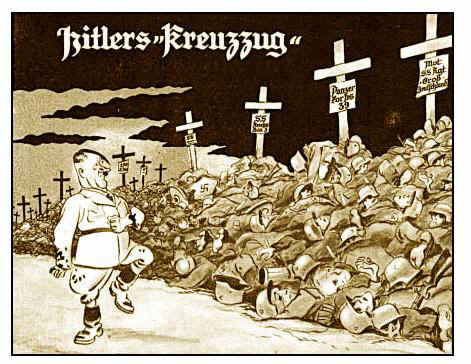After World War I, Hitler remained in the army and returned to Munich, where he – in contrast to his later declarations – attended the funeral march for the murdered Bavarian prime minister Kurt Eisner.[43] After the suppression of the Bavarian Soviet Republic, he took part in "national thinking" courses organized by the Education and Propaganda Department (Dept Ib/P) of the Bavarian Reichswehr Group, Headquarters 4 under Captain Karl Mayr. Scapegoats were found in "international Jewry", communists, and politicians across the party spectrum, especially the parties of the Weimar Coalition.
In July 1919, Hitler was appointed a Verbindungsmann (police spy) of an Aufklärungskommando (Intelligence Commando) of the Reichswehr, both to influence other soldiers and to infiltrate a small party, the German Workers' Party (DAP). During his inspection of the party, Hitler was impressed with founder Anton Drexler's anti-semitic, nationalist, anti-capitalist and anti-Marxist ideas, which favoured a strong active government, a "non-Jewish" version of socialism and mutual solidarity of all members of society. Drexler was impressed with Hitler's oratory skills and invited him to join the party. Hitler joined DAP on 12 September 1919[44] and became the party's 55th member.[45] He was also made the seventh member of the executive committee.[46] Years later, he claimed to be the party's seventh overall member, but it has been established that this claim is false.[47]
Here Hitler met Dietrich Eckart, one of the early founders of the party and member of the occult Thule Society.[48]The Thule members believed in the coming of a “German Messiah” who would redeem Germany after its defeat in World War I. Dietrich Eckart expressed his anticipation in a poem he published months before he met Hitler for the first time. In the poem, Eckart refers to ‘the Great One’, ‘the Nameless One’, ‘Whom all can sense but no one saw’.When Eckart met Hitler in 1919 he believed to have found the prophesied redeemer.[49] Eckart became Hitler's mentor, exchanging ideas with him, teaching him how to dress and speak, and introducing him to a wide range of people. Hitler thanked Eckart by paying tribute to him in the second volume of Mein Kampf. To increase the party's appeal, the party changed its name to the Nationalsozialistische Deutsche Arbeiterpartei or National Socialist German Workers Party (abbreviated NSDAP).
Hitler was discharged from the army in March 1920 and with his former superiors' continued encouragement began participating full time in the party's activities. By early 1921, Hitler was becoming highly effective at speaking in front of large crowds. In February, Hitler spoke before a crowd of nearly six thousand in Munich. To publicize the meeting, he sent out two truckloads of party supporters to drive around with swastikas, cause a commotion and throw out leaflets, their first use of this tactic. Hitler gained notoriety outside of the party for his rowdy, polemic speeches against the Treaty of Versailles, rival politicians (including monarchists, nationalists and other non-internationalist socialists) and especially against Marxists and Jews.
The NSDAP[50] was centred in Munich, a hotbed of German nationalists who included Army officers determined to crush Marxism and undermine the Weimar republic. Gradually they noticed Hitler and his growing movement as a suitable vehicle for their goals. Hitler traveled to Berlin to visit nationalist groups during the summer of 1921, and in his absence there was a revolt among the DAP leadership in Munich.
The party was run by an executive committee whose original members considered Hitler to be overbearing. They formed an alliance with a group of socialists from Augsburg. Hitler rushed back to Munich and countered them by tendering his resignation from the party on 11 July 1921. When they realized the loss of Hitler would effectively mean the end of the party, he seized the moment and announced he would return on the condition that he replace Drexler as party chairman, with unlimited powers. Infuriated committee members (including Drexler) held out at first. Meanwhile an anonymous pamphlet appeared entitled Adolf Hitler: Is he a traitor?, attacking Hitler's lust for power and criticizing the violent men around him. Hitler responded to its publication in a Munich newspaper by suing for libel and later won a small settlement.
The executive committee of the NSDAP eventually backed down and Hitler's demands were put to a vote of party members. Hitler received 543 votes for and only one against. At the next gathering on 29 July 1921, Adolf Hitler was introduced as Führer of the National Socialist German Workers' Party, marking the first time this title was publicly used.
Hitler's beer hall oratory, attacking Jews, social democrats, liberals, reactionary monarchists, capitalists and communists, began attracting adherents. Early followers included Rudolf Hess, the former air force pilot Hermann Göring, and the army captain Ernst Röhm, who eventually became head of the Nazis' paramilitary organization, the SA (Sturmabteilung, or "Storm Division"), which protected meetings and attacked political opponents. As well, Hitler assimilated independent groups, such as the Nuremberg-based Deutsche Werkgemeinschaft, led by Julius Streicher, who became Gauleiter of Franconia. Hitler attracted the attention of local business interests, was accepted into influential circles of Munich society, and became associated with wartime General Erich Ludendorff during this time.




_svg.png)


